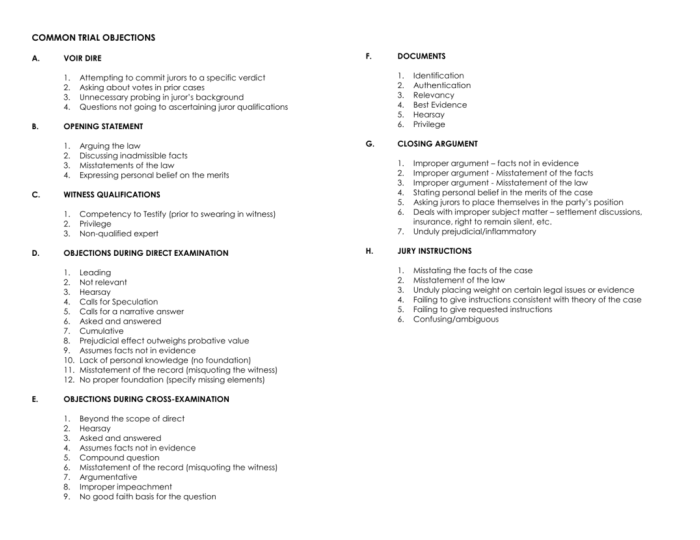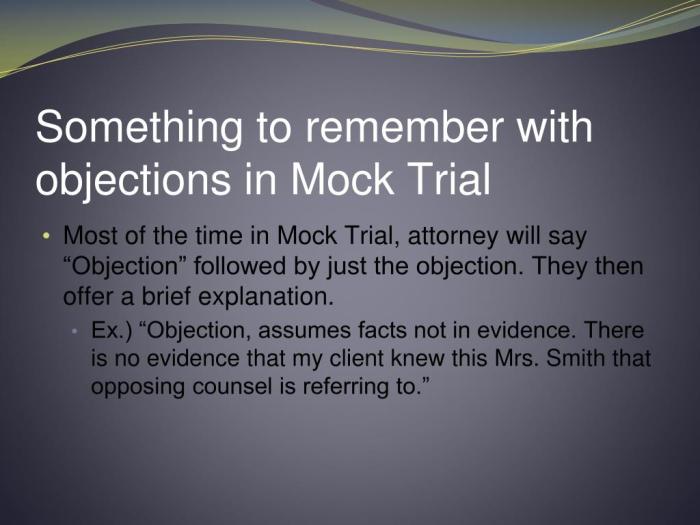Types of objections in mock trial – In the realm of mock trial, the strategic use of objections is a cornerstone of effective advocacy. Objections, when raised appropriately, can safeguard the rights of clients, ensure fairness in the proceedings, and advance the progress of the case. This comprehensive guide delves into the intricacies of objections in mock trial, providing a thorough understanding of their types, grounds, timing, and strategic applications.
From understanding the concept of objections to mastering the art of responding to them, this guide equips trial advocates with the knowledge and skills necessary to navigate the complexities of mock trial.
Types of Objections in Mock Trial

In mock trial, objections are essential tools for maintaining the integrity of the proceedings and ensuring fairness for both parties. They allow attorneys to challenge the admissibility of evidence, the form of questions, or the conduct of the trial.
Objections can be categorized into several types, each with its own specific purpose and grounds.
Grounds for Objections
Objections are based on specific legal grounds that justify the exclusion of evidence or the correction of improper conduct. Common grounds for objections include:
- Relevance: Evidence must be relevant to the case and cannot be used to prove facts that are not in dispute.
- Hearsay: Hearsay evidence is testimony about what someone else said or did and is generally inadmissible unless there is an exception.
- Privilege: Certain communications are protected by privilege and cannot be disclosed in court.
- Best Evidence Rule: The best evidence of a fact is the original document or recording, and secondary evidence is generally not admissible.
- Leading Questions: Leading questions suggest the answer and are generally not allowed on direct examination.
Timing and Form of Objections
Objections must be raised at the appropriate time, typically when the objectionable conduct or evidence is offered or presented. Objections should be stated clearly and concisely, using the proper legal terminology.
Common mistakes to avoid when objecting include:
- Objecting too late or too early
- Using vague or ambiguous language
- Failing to state the specific grounds for the objection
Responding to Objections, Types of objections in mock trial
The judge will rule on the objection, either sustaining it or overruling it. If an objection is sustained, the evidence or conduct will be excluded from the trial. If an objection is overruled, the evidence or conduct will be admitted.
Attorneys should be prepared to respond to objections from opposing counsel and to defend their own objections when necessary.
Strategic Use of Objections
Objections can be used strategically to advance or defend a case. By objecting to inadmissible evidence, attorneys can prevent harmful information from being presented to the jury.
Objections can also be used to control the pace of the trial, to interrupt opposing counsel’s line of questioning, or to highlight important issues for the jury.
Common Objections and Responses
| Objection | Response |
|---|---|
| Relevance | The evidence is relevant because it shows the defendant’s motive for committing the crime. |
| Hearsay | The statement is admissible as an exception to the hearsay rule because it is a dying declaration. |
| Privilege | The communication is protected by the attorney-client privilege and cannot be disclosed. |
| Best Evidence Rule | The original document is not available, and the secondary evidence is the best available evidence of its contents. |
| Leading Questions | The question is not leading because it does not suggest the answer. |
Questions and Answers
What are the primary types of objections in mock trial?
Objections in mock trial fall into several categories, including relevance, hearsay, leading questions, speculation, and privilege.
What is the basis for an objection on the grounds of relevance?
An objection on the grounds of relevance is raised when the evidence offered does not have any bearing on the issues being tried or is not logically connected to the case.
When should an objection be raised in mock trial?
Objections should be raised promptly after the objectionable material is introduced or as soon as the basis for the objection becomes apparent.
